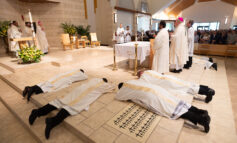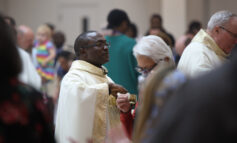By Father Thomas Esposito
Special to The Texas Catholic
“Why should I be happy?”
I wasn’t expecting such a snappy retort to my friendly question “Are you happy?”, even though the respondent was my scowling confrere Father Roch Kereszty. Never satisfied with facile and clichéd conversations, Father Roch always resisted the shallow and automatic answers we give to questions that are usually superficial, but can often contain profound depths.
If you ask most people (other than Father Roch) “Do you want to be happy?”, they will likely answer “Yes!” without much hesitation. If you ask them “What is happiness?”, you are likely to get a splendid variety of secular and sacred answers: “Being at peace…getting or doing what I want…living freely…finding meaning in my life…a feeling of bliss…retiring when I want to…sweet vengeance on my enemy…union with God in prayer”. If you ask them, “Why should you be happy?”, they might look confused for a moment…and that moment could yield a fruitful reflection on the depths within oneself.
My edition of St. Augustine’s “Confessions,” the first and greatest spiritual autobiography ever written, gives “happiness” as the translation of beata vita, “the blessed life.” For Augustine, happiness is not an emotion that produces a blissful feeling of pleasure; it is the state in which we find ourselves perfectly aligned with God, our desires perfectly ordered to the beginning and end of all desire: “How then do I seek You, O Lord? For in seeking You, my God, it is happiness that I am seeking.” The beata vita we experience during our lives is what we instinctively desire on earth as it will be in heavenly beatitude. The desire for such happiness is stored innately in our memories and our motives, even if we cannot account for the “why” behind our pursuit. While the Declaration of Independence remains utterly vague regarding the definition of our right to “the pursuit of happiness,” Augustine specifies the nature of that beatitude directing our restless hearts to the Fount of every blessing:
“For there is a joy which is not given to the ungodly but only to those who love Thee for Thy own sake, whose joy is Thyself. And this is happiness, to be joyful in Thee and for Thee and because of Thee, this and no other. Those who think happiness is any other, pursue a joy that is apart from Thee and is no true joy. Yet their will is not wholly without some image of joy.”
Augustine’s simple definition of happiness is “joy in truth”: “This vita beata all desire, this which alone is happiness all desire, for all desire to have joy in truth.” Even in disordered desires, such as lust, greed, and curiosity, Augustine identifies an underlying desire that could, if directed to God as the Supreme Good, put us on the path to the beata vita. Lust, as he knew all too well, is the corruption of a genuine love that sees the beloved in the light of the Lord, not one’s own passion for control or pleasure. Augustine somehow knew that he did not know the full delights of the vita beata until he loved everything and everyone in God; in his anguished account of his conversion, he describes how he found God lurking in his memory and within his soul, waiting to be found in the legitimate desires of this world:
“If material things please you then praise God for them but turn back your love upon Him who made them: lest in the things that please you, you displease Him. If souls please you, then love them in God because they are mutable in themselves but in Him firmly established: without Him they would pass and perish. Love them, I say, in Him, and draw as many souls with you to Him as you can.”
Augustine’s wisdom regarding the attainment of the blessed life is as timeless and timely, as ever ancient and ever new, as the Lover who invites us to love not on our own terms, but His.
Father Thomas Esposito, O.Cist., is a monk at the Cistercian Abbey of Our Lady of Dallas and teaches in the theology department at the University of Dallas.



